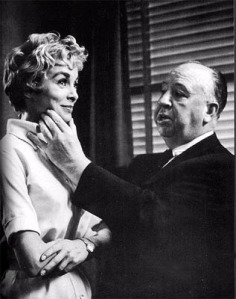
Hitchcock's Best
Hitchcock told French director François Truffaut: "There are two men sitting in a train going to Scotland and one man says to the other, 'Excuse me, sir, but what is that strange parcel you have on the luggage rack above you?' 'Oh,' says the other, 'that's a Macguffin.' 'Well,' says the first man, 'what's a Macguffin?' The other answers, 'It's an apparatus for trapping lions in the Scottish Highlands.' 'But,' says the first man, 'there are no lions in the Scottish Highlands.' 'Well,' says the other, 'then that's no Macguffin.'"
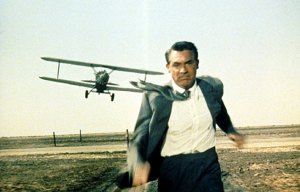
10. North by Northwest
The title (from Hamlet's "I am but mad north-northwest: when the wind is southerly, I know a hawk from a handsaw") is the clue to the mad geography and improbable plot. The compass seems to be spinning as the action hops all over the U.S., people rush about in the wrong direction, and, for no particular reason, the hero-played by Cary Grant-heads north (by Northwest Airlines). It goes on too long, and the script seems shaped to accommodate various set pieces (such as the chase on Mount Rushmore) that he wants to put in.

But it has a classic sequence, in which a crop-dusting plane tries to dust Grant, and it has a genial, sophisticated, comic tone. Just about everybody in it is a spy or a government agent (except Grant, who is mistaken for one). His performance is very smooth and appealing, and he looks so fit that he gets by with having Jessie Royce Landis, who was born the same year he was, playing his mother. - Pauline Kael
9. Strangers on a Train
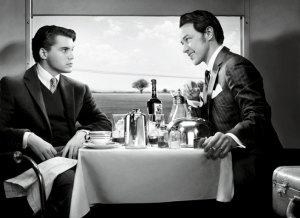
Alfred Hitchcock's bizarre, malicious comedy, in which the late Robert Walker brought sportive originality to the role of the chilling wit, dear degenerate Bruno; it's intensely enjoyable - in some ways the best of Alfred Hitchcock's American films. The murder plot is so universally practical that any man may adapt it to his needs: Bruno perceives that though he cannot murder his father with impunity, someone else could; when he meets the unhappily married tennis player Guy (Farley Granger), he murders Guy's wife for him and expects Guy to return the favor. Technically, the climax of the film is the celebrated runaway merry-go-round, but the high point of excitement and amusement is Bruno trying to recover his cigarette lighter while Guy plays a fantastically nerve-racking tennis match.
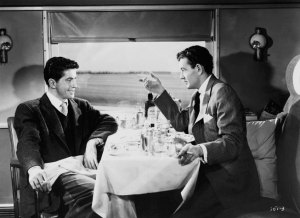
Even this high point isn't what we remember best - which is Robert Walker. It isn't often that people think about a performance in a Alfred Hitchcock movie; usually what we recall are bits of "business" - the stump finger in The 39 Steps, the windmill turning the wrong way in Foreign Correspondent, etc. But Walker's performance is what gives this movie much of its character and its peculiar charm. It is typical of Hollywood's brand of perversity that Raymond Chandler was never hired to adapt any of his own novels for the screen; he was, however, employed on Double Indemnity and Strangers on a Train (which is based on a novel by anti-Semite Patricia Highsmith). Chandler (or someone-perhaps Czenzi Ormonde, who's also credited) provided Hitchcock with some of the best dialogue that ever graced a thriller. - Pauline Kael
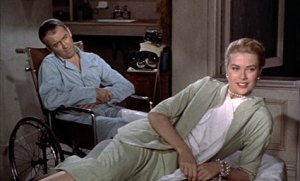
8. Rear Window
All the best films of the next few decades borrowed from this. There's a reason he was worshiped in Europe and beloved by the French. He redefined diegetic point of view and made it fun to be the watcher. It's like he understood semiotics so instinctively that he always knew where to put the camera. Only the acting here is outdated. It badly deserves a remake, and we really, really, really love this casting:
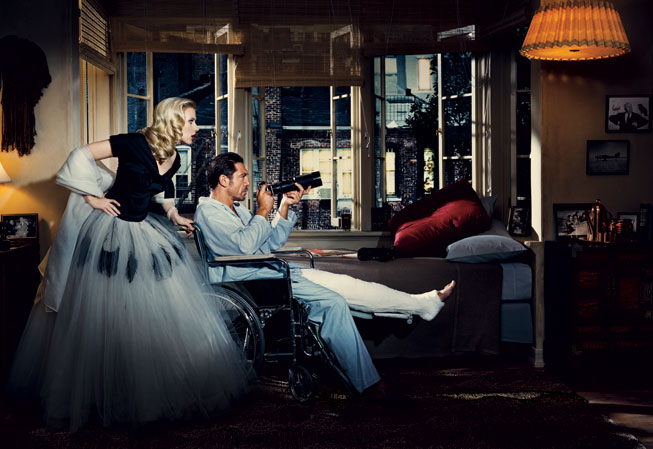
It's really a shame. They would have been the greatest celeb couple of all time.

7. The Birds
If you haven't seen The Birds, you probably think it's just a highbrow Arachnophobia. On the contrary - the film begins with a completely different plot, and the incident in the title is expertly woven in.
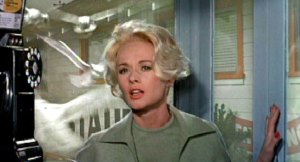
Hitchcock:
Truffaut understood very well that I depend on style more than plot. It is how you do it, and not your content that makes you an artist. A story is simply a motif, just as a painter might paint a bowl of fruit just to give him something to be painting. Once the screenplay is finished, I'd just as soon not make the film at all. All the fun is over. I have a strongly visual mind.
[youtube=http://www.youtube.com/watch?v=Q8oLL44bq_Y&feature=related]
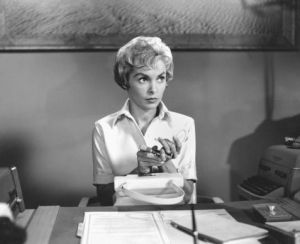
I visualize a picture right down to the final cuts. I write all this out in the greatest detail in the script, and then I don't look at the script while I'm shooting. I know it off by heart, just as an orchestra conductor needs not look at the score. It's melancholy to shoot a picture. When you finish the script, the film is perfect. But in shooting it you lose perhaps 40 per cent of your original conception.
master of paradox
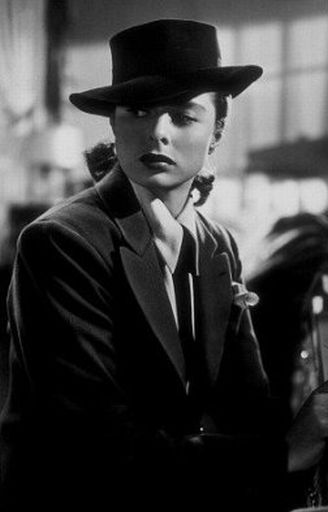
6. Notorious
When he was very small, Alfred Hitchcock was sent down to the local police station with a note from his father. The superintendent read the note and locked young Alfred in a cell for five or ten minutes, saying, 'That is what we do to naughty boys.' The incident was probably not as dire as it sounds, and Hitchcock himself is offhand enough about it.
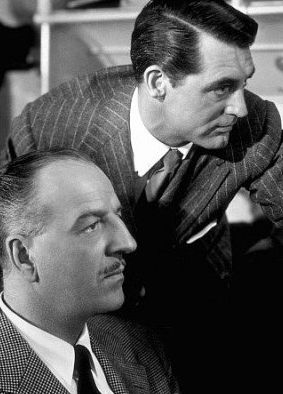
Still, the collusion of paternal and civil authorities must have been unsettling, and the flavor of the story persists into many of Hitchcock's films, where more or less well-meaning representatives of order regularly commit, or are on the edge of committing, horrible injustices in the name of reason and probability.
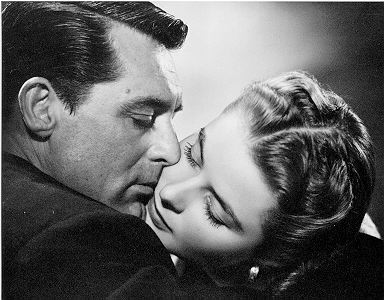
5. Psycho

alfred hitchcock geek
Those viewing Psycho today take it entirely out of context. Among the most imitated of Hitchcock's films, it is a masterpiece of production and and filmmaking over script and acting. It may in fact be the best directed film in light of its script and budget ever made.
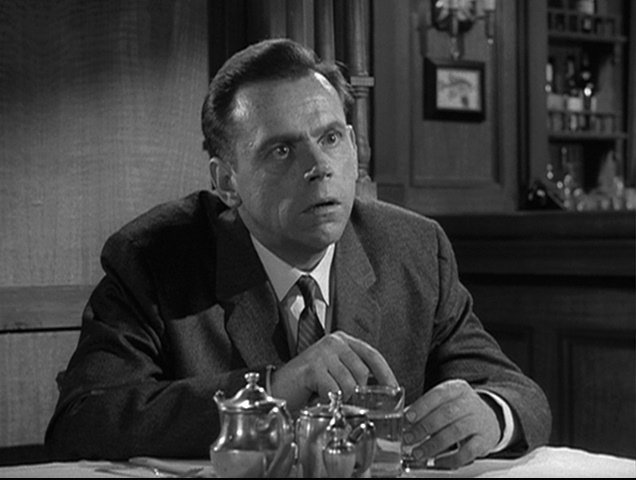
4. The Taking of Mr. Pelham
A forty minute episode of Hitchcock's series Alfred Hitchcock Presents, it was one of only two episodes of the show directed by him. Everything about it is note perfect. It may be the finest piece of television drama ever conceived. What he does here on like three sets is absolutely jaw-dropping.
3. Shadow of a Doubt
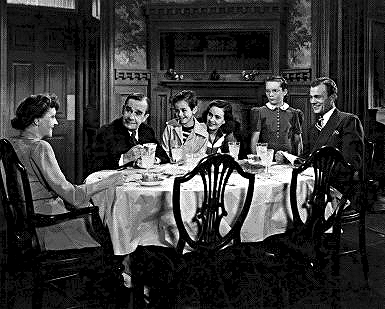
When Hitchcock saw the Mel Brooks 1977 comedy-spoof of his work, High Anxiety, he enjoyed it, but Brooks initially feared that Hitchcock was not pleased because he walked out of the movie when it was over. Days later, Brooks' fear proved untrue as Hitchcock had sent Brooks a bottle of champagne

2. Rebecca
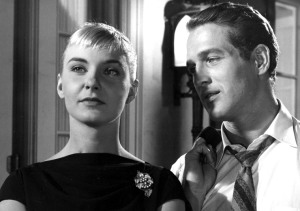
1. Vertigo
Over and over in his films, Hitchcock took delight in literally and figuratively dragging his women through the mud--humiliating them, spoiling their hair and clothes as if lashing at his own fetishes. Judy, in Vertigo, is the closest he came to sympathizing with the female victims of his plots. And Novak, criticized at the time for playing the character too stiffly, has made the correct acting choices: Ask yourself how you would move and speak if you were in unbearable pain, and then look again at Judy. - Roger Ebert

I suppose that if I were hard-pressed to answer this question – and I suppose I am – I'd have to say Bernard Herrmann's score for Vertigo (1958). Hitchcock's film is about obsession, which means that it's about circling back to the same moment, again and again. Which is probably why there are so many spirals and circles in the imagery – Stewart following Novak in the car, the staircase at the tower, the way Novak's hair is styled, the camera movement that circles around Stewart and Novak after she's completed her transformation in the hotel room, not to mention Saul Bass' brilliant opening credits, or that amazing animated dream sequence. And the music is also built around spirals and circles, fulfilment and despair. Herrmann really understood what Hitchcock was going for – he wanted to penetrate to the heart of obsession. - Martin Scorsese
You can download the complete soundtrack here.

THEY WERE DEAD BEFORE THE SHIP EVEN SANK
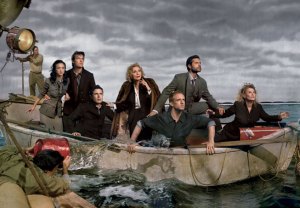
"River" - Oaks (mp3)
"Spine" - Oaks (mp3)
"Reeling" - Oaks (mp3)

PREVIOUSLY ON THIS RECORDING
Our growing cinematic orgasm.
Some songs are deceptively simple.
The genius of Ed Koch.
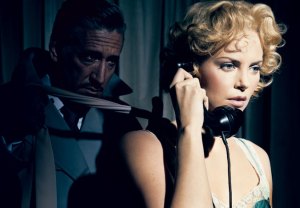
from here